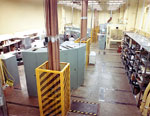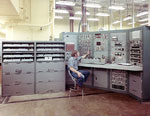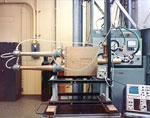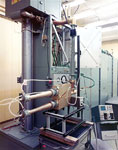PAR Complex Photo Comments
- Photo Sources:
-
3nnn: Denis Abbott
Denis Abbott (Technical maintenance and repair center (TMRC)):
Visible are various test sets and the flexible copper conduits that ran throughout the building. These conduits were a "hardening" feature; they allowed the wiring to move without damage in the event of a nuclear attack. Yellow striped guards provided protection from forklift traffic, etc.
Visible are various test sets and the flexible copper conduits that ran throughout the building. These conduits were a "hardening" feature; they allowed the wiring to move without damage in the event of a nuclear attack. Yellow striped guards provided protection from forklift traffic, etc.
Denis Abbott (Low frequency test set):
The cabinets held various fixtures and connectors to allow a number of different components to be tested.
The cabinets held various fixtures and connectors to allow a number of different components to be tested.
Denis Abbott (Power splitter under test in TWT test area):
RF (radio frequency) power comes from the cylindrical TWT behind the splitter. Power enters the splitter and is measured as it comes in from the right side. RF is split in the center box and goes to two dummy loads on the left side. Tubing removes water heated by the RF energy in the dummy loads.
RF (radio frequency) power comes from the cylindrical TWT behind the splitter. Power enters the splitter and is measured as it comes in from the right side. RF is split in the center box and goes to two dummy loads on the left side. Tubing removes water heated by the RF energy in the dummy loads.
Denis Abbott (Power splitter under test in TWT test arear):
Vertical cylinder is a TWT that supplies the RF power for the PAR radar system. The TWT is approximately 8 feet long. This equipment is normally used to test TWT's prior to installation but in this photo it is configured to test the power splitter in the foreground. RF power leaves the tube at the top and is routed to the right and downward to the splitter under test.
Vertical cylinder is a TWT that supplies the RF power for the PAR radar system. The TWT is approximately 8 feet long. This equipment is normally used to test TWT's prior to installation but in this photo it is configured to test the power splitter in the foreground. RF power leaves the tube at the top and is routed to the right and downward to the splitter under test.
Denis Abbott (Calibration and test equipment repair (CTER) center):
The CTER center kept calibrations current on all test equipment using standards traceable to the N.B.S (National Bureau of Standards). It also tested and repaired test equipment on site.
The CTER center kept calibrations current on all test equipment using standards traceable to the N.B.S (National Bureau of Standards). It also tested and repaired test equipment on site.
End of page.




